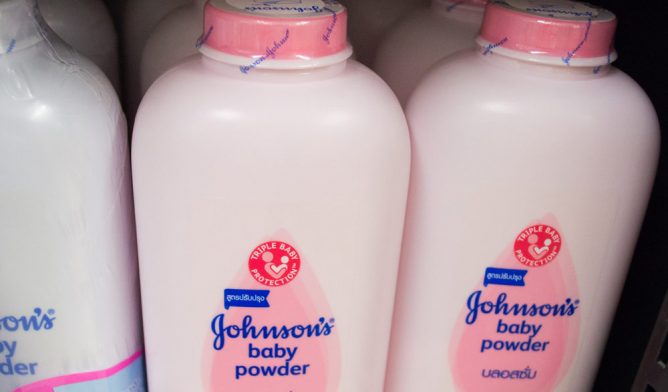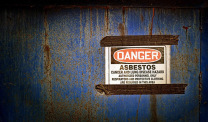Johnson & Johnson Ends Talc-Based Baby Powder Sales in US, Canada
Asbestos Exposure & BansWritten by Tim Povtak | Edited By Walter Pacheco

Johnson & Johnson announced Tuesday that it will stop selling its iconic, talc-based baby powder, the target of thousands of lawsuits claiming that its talc was contaminated with asbestos, which led to cancers such as mesothelioma and ovarian cancer.
The company said the stoppage is only in the United States and Canada, citing a decline in consumer demand and “misinformation” about the safety of the product.
“Demand for talc-based Johnson’s Baby Powder in North America has been declining due in large part to changes in consumer habits and fueled by misinformation around the safety of the product and a constant barrage of litigation advertising,” Johnson & Johnson said in a statement posted on its website.
Retailers will continue selling the product until current inventory runs out. Johnson & Johnson will keep selling it in other countries, where the demand has remained higher. A cornstarch-based version will be available in the U.S. and Canada.
Dr. Jacqueline Moline, a professor at Feinstein Institutes for Medical Research in Manhasset, New York, whose research interests include World Trade Center health effects and asbestos exposure, calls the discontinuation of J&J’s talc-based powder a “great public health victory.”
“Removing a product that contains asbestos from the shelves means there is one less source of this deadly fiber available for consumers,” Moline told The Mesothelioma Center at Asbestos.com. “The lives of countless people will be saved.”
Asbestos Lawsuits Overwhelm Johnson & Johnson
Johnson & Johnson has remained steadfast that its talc-based baby powder is safe to use and continues to aggressively fight the lawsuits and verdicts against it.
More than 19,000 cases have been filed in U.S. federal and state courts.
The lawsuits generally contend that long-term use of the product can cause inflammation that leads to a number of malignancies. There is no warning label on the product. The majority of the cases involve women and ovarian cancers.
Many of the cases also cite the presence of toxic asbestos fibers that have contaminated the talc, an issue that has spread across many consumer products in the market today. Talc, the world’s softest mineral, is used in hundreds of products to absorb moisture and improve the feel.
Asbestos and talc are both naturally occurring minerals that often are found in close proximity near the Earth’s surface. Asbestos is a well-known carcinogen, and its inhalation or ingestion can lead to a number of serious health issues such as mesothelioma cancer, lung cancer and asbestosis.

If you think you were exposed to asbestos using talc, we can help match you with an attorney. Get the compensation you deserve.
Get Help NowFDA Finds Asbestos in Talc Products
Johnson & Johnson recalled approximately 33,000 bottles of its baby powder in October 2019 — citing an abundance of caution — after the U.S. Food and Drug Administration announced that a laboratory test found a small amount of asbestos in one sample.
The company later said that subsequent testing of the same bottle of talc, by different laboratories, found no asbestos in any samples it had taken.
“Johnson & Johnson remains steadfastly confident in the safety of talc-based Johnson’s Baby Powder. Decades of scientific studies by medical experts around the world support the safety of our product,” its Tuesday statement said. “We will continue to vigorously defend the product, its safety and the unfounded allegations against it and the Company in the courtroom.”
The FDA announced in March that it found asbestos-contaminated talc in nine of the 52 cosmetic products it tested during a year-long study. One of those products was Johnson’s Baby Powder. The other eight were makeup products.
Johnson & Johnson’s Reputation Damaged
Although the sale of its baby powder amounts to just a small fraction (0.5%) of its consumer health sales, Johnson & Johnson’s reputation has been badly hurt by the ongoing controversy.
And the lawsuits have been costly.
Earlier this year, the company was ordered to pay $750 million in punitive damages by a New Jersey jury to four people who said their mesothelioma was caused by long-term use of Johnson’s Baby Powder. The judge reduced the damages to $186.5 million, and the company filed an appeal.
In 2018, a jury in St. Louis ordered Johnson & Johnson to pay $4.69 billion in damages to 22 women and their families who said their ovarian cancers were caused by the baby powder. The case is still under appeal.
The company has been fighting the lawsuits with mixed success. According to Tuesday’s statement, all verdicts against Johnson & Johnson that have gone through the appeals process have been reversed.
Earlier this month, French-based Imerys, which is the talc mining supplier of Johnson & Johnson, placed all of its subsidiaries in North America on the market to avoid further financial damages from asbestos-related lawsuits.
In 2019, Imerys Talc America and two of its subsidiaries filed for Chapter 11 bankruptcy protection. The mining giant is facing more than 14,000 claims in courts across the U.S. regarding asbestos-contaminated talc.
COVID-19 Puts J&J Litigation on Hold
Several ongoing cases involving Johnson’s Baby Powder have been put on hold due to the courtroom closings caused by COVID-19 and the need for social distancing.
On its website, J&J said that its decision to stop selling the baby powder was part of its portfolio assessment sparked by the COVID-19 pandemic.
The company stopped shipping many of its products this spring to prioritize high-demand products needed to fight the all-encompassing coronavirus, along with allowing more social distancing at its facilities.
In the past two years, Johnson & Johnson has been the target of a large number of lawsuits covering a range of products.






